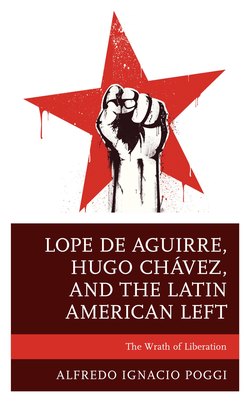Читать книгу Lope de Aguirre, Hugo Chávez, and the Latin American Left - Alfredo Ignacio Poggi - Страница 3
На сайте Литреса книга снята с продажи.
Prologue
ОглавлениеIn 1998, when I arrived in Venezuela as a teenager, I learned that a military officer lived on the third floor of my building. He was controversial, yet popular. He had once participated in a failed military coup, wound up in prison, and was eventually set free in an act of political amnesty by Rafael Calderas, who was president of Venezuela at the time. My neighbor’s name was Hugo Chávez. When my mother and I met him in our elevator, we never suspected that he would become a world leader.
It so happened that during those months, I was reading the first book I ever bought for pleasure: The Diary of Che Guevara. As a good Argentine teenager, I was drawn to this soldier’s romantic life fighting U.S. imperialism in order to bring about social equality and the unity of the Latin American continent. Che’s furious personality had turned him into a superhero who stood up against all adversity and embarked on the most fantastic adventures. Those pages found an echo in Chávez’s speeches, which I started watching on T.V. He kicked off his presidential campaign with a vindictive speech in a country beset by its own alarming social inequality. He rapidly seduced a people tired of corruption and of a neoliberal bureaucracy associated with the United States.
Like Hegel watching Napoleon ride past him on horseback, I could also say that I saw the spirit of history pass before me; but more than passing before me, I saw its course begin to plummet. On the day of the election, I sat on my balcony and saw Chávez riding our elevator down to the bottom floor, where he left the building to the sound of boos and applause to become president for life in Venezuela. With the passage of months and years, his anti-imperialist and liberating historical project also sank, metaphorically, to a vindictive and oppressive low.
During the first years of his government, I became part of the student movement that protested peacefully against Chávez’s dictatorial measures, which included abolishing presidential term limits even after a popular referendum on the question had voted the proposal down. We were met with tear gas and unjust imprisonment; some of my colleagues even lost their lives under the violent repression of the National Guard and armed revolutionary groups known as the Bolivarian Circles. When I finished my studies in journalism, I also witnessed a government crackdown on the media. For example, I produced a television show in which I highlighted the work of nongovernmental organizations in poor neighborhoods in Venezuela; but whenever I included any criticism of the government’s policies, that part of the program would disappear “mysteriously” from the air.
As a university professor, I also witnessed Chávez’s attacks on any academic institutions that refused to lend support to his social vision. For instance, most of the research on poverty and development that we conducted at the Andrés Bello Catholic University with the sponsorship of private companies disappeared due to government opposition, as the Socialist Party passed a law requiring its own approval before university funds could be disbursed for research. In his daily addresses, Chávez supported these measures against his enemies with angry invective that appealed to a historical debt dating back to the sixteenth century. Chavista justice was more like a settling of scores, an angry vendetta in which there were only good and bad, patriots and antagonists of the empire.
Meanwhile, great Latin American thinkers whom I admired—such as Eduardo Galeano, Ernesto Laclau, Enrique Dussel, and several members of the prestigious Modernity/Coloniality Group (Walter Mignolo, Ramón Grosfoguel, among others)—supported the Chavista project without voicing any criticism of its oppressive measures. The most influential twentieth-century intellectual tradition on the continent, the anti-imperialist and liberationist thought of the Latin American left, purported to see in Chávez—and in the whole so-called “Pink Tide” that swept other such figures to power in neighboring countries—the embodiment of its most basic ideas; accordingly, it lent ideological justification to his political actions, blaming the media, the United States, and the world capitalist system for all of society’s woes.
After twenty years of Chavista government, Venezuela is now submerged in a political, economic, and social crisis, including a spiral of violence that has earned it the dubious distinction of having the second-highest peacetime murder rate in the world. This leads me to wonder: Are the politics of Hugo Chávez not merely a corruption, but rather a natural consequence, of the basic principles of Latin American anti-imperialism? How else could so many prestigious thinkers have supported Chávez’s rule unconditionally for two decades, despite its oppressive and destructive character?
